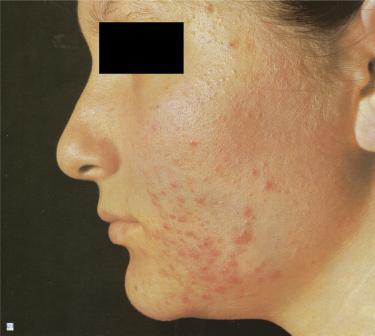Acne vulgaris (pimples) (common acne)
Dr Christophe Hsu – dermatologist. Geneva, Switzerland

- Acne Vulgaris
What is the cause of acne?
There are several causes of acne. One theory is that when the male hormone level (testosterone) increases during puberty, the skin of an acne prone person reacts to the hormone and produces excess sebum. No one knows why some individual’s oil glands produce more sebum than others, but when this happens, the oil glands become clogged. This leads to the formation of comedones – blackheads and whiteheads. In some people, acne does not progress beyond this stage, but generally it does.
The Bacteria located in the deeper part of the hair follicles and beneath the sebum release chemical substances which act upon the sebum and break it down to release other chemical substances. These chemicals render the skin around the hair follicle red and inflamed, resulting in a pimple. If this evolves, pus may accumulate within the pimple. Then, large, painful swellings called nodules and cysts may develop and in the end result in scarring after the condition has eventually settled. These scars can either be depressed and sunken, or bulging and hard.
False beliefs?
- “chocolate and fatty foods cause acne”: this is very controversial but acne is caused by oil in follicles, not by food in your stomach.
- “sunlight makes acne better”: there is no evidence that this is true.
- “acne worsens if I don’t wash my face”: acne is not caused by dirt.
- “acne is caused by having too much sex”: good heavens this is wrong!
- “masturbation causes acne”: of course not!
What should I do if I have acne?
Consult your dermatologist early. Waiting to “outgrow” acne is often a serious mistake, since medical treatment can improve your appearance and prevent the development of severe permanent scars.
How is acne treated?
a. Treatment applied on the skin
Patients with mild acne usually respond well to topical treatments. This includes sulphur and resorcinol preparations, benzoyl peroxide containing preparations, antibiotics (erythromycin and clindamycin gel and lotions) and vitamin A derived creams or gels (adapalene and tretinoin). Some lotions or creams may make the skin red or flaky but these side effects are usually temporary. Consult your dermatologist if ther lotions or creams cause excessive redness or irritation. To learn more about creams to apply on the skin, click here
b. Oral treatment
If your acne worsens and that you have a lot of inflamed spots, local treatment alone may not be adequate. Your dermatologist may prescribe antibiotics tablets, such as doxycyline, erythromycin or minocycline.
Whichever antibiotics you are prescribed, you will probably need to take it for a few months.
c. For severe acne
In very serious cases who do not respond to the above treatment, or in cases of severe nodulocystic acne, a medication called isotretinoin may be given. This medication is effective but may give rise to side effects, the most serious being irreversible damage to the newborn if taken during pregnancy. Click here to learn more about isotretinoin.
Does diet cause or aggravate acne?
There is no firm scientific evidence to show that diet in any way might influence acne. In the majority of cases, no dietary restrictions are required.
How should I wash my face?
Remove surface oil from the face by washing with mild soap and water or with a mild, medicated cleanser. Do not use harsh cleansers. Remember, you cannot wash acne away.
Does squeezing the pimples affect the outcome?
It is usually advisable not to squeeze the pimples, especially if they are deep. Superficial whitish or yellowish pimples may be gently squeezed to remove the purulent contents. If excessive pressure is required to remove the contents, then pimples should not be squeezed. Otherwise the irritant material may be squeeze into the surrounding skin (dermal inflammation) and produce pimples which may be bigger, last longer and result in scarring.
Can I hide my acne spots?
You may but use as little concealer as possible and make sure it is non comedogenic (=does not promote the formation of pimples). Remove the cream as soon as you don’t need it anymore.
Can I use cosmetics or sunscreens when I have acne?
Very greasy make-up may worsen acne. Use water-soluble oil-free cosmetics that do not promote the formation of comedones or pimples (non comedogenic). Ask for assistance when you are selecting cosmetics.
Acne is condition which develops in and around the hair follicles as well as their oil producing glands (called the sebaceous glands). Although we have these glands all over the surface of our body, it is only on the face, chest and back that acne develops. The oil produced by sebaceous glands is called the sebum and it begins to appear soon after puberty. Acne usually starts during teenage years but can also begin in the twenties or thirties.
Contributors
Dr Christophe Hsu – dermatologist. Geneva, Switzerland
Dr Husain Ali Mahdi Juma (دكتورحسين علي جمعه) – dermatologist. Manama, Bahrain
National Skin Centre. Singapore
Category : Acne Vulgaris - Modifie le 11.28.2009Category : acne vulgaris - Modifie le 11.28.2009Category : boutons d'adolescence - Modifie le 11.28.2009Category : pimples - Modifie le 11.28.2009Category : problèmes de peau de l'adolescent - Modifie le 11.28.2009Category : skin problems during adolescence - Modifie le 11.28.2009Category : skin problems in teenagers - Modifie le 11.28.2009


